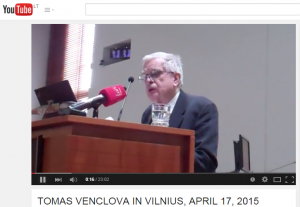A day-long conference April 17 capped efforts in Lithuania’s capital city this year to mark Yom haShoah, Holocaust Day, appropriately, and featured speakers as diverse as Vilnius’s mayor, esteemed writer and thinker Tomas Venclova and Efraim Zuroff, director of the Simon Wiesenthal Center in Jerusalem and now director for Eastern Europe as well, who is often referred to as “the last Nazi hunter.”
The Lithuanian Jewish Community was also amply represented there, with a keynote speech by LJC chair Faina Kukliansky and outgoing LJC executive director Simonas Gurevičius acting as moderator.
Other speakers included Pavel Tychtl from the European Commission, Dovid Katz of DefendingHistory.com, Piotr Kowalik of the Polish Jewish Museum in Warsaw, the historian and writer Saulius Sužiedelis and others.
Vilnius mayor Artūras Zuokas welcomed conference participants and recalled: “Several years ago when I was visiting Israel, honored and esteemed president Peres said: ‘There are two cities important to Jews in the world: Jerusalem in Israel and the other Jerusalem in the north, in Lithuania, which is Vilna.’ I will always remember that. And if you look at Vilnius as Jerusalem, it appears completely different—even more ancient, more colorful, holier. We may together remember our shared history, together we may build monuments and markers of memory to past events, together we may take stock of and be encouraged by our achievements, and create a happy, friendly future.”
Tomas Venclova, who lived in Vilnius when Lithuania was part of the USSR and went to America then, where he wrote a number of books and ended up teaching Polish and Russian literature at Yale University, spoke about the changes which have taken place within Lithuanian society in the 40 years since he wrote a seminal work on Lithuanian and Jewish relations. Venclova said the idea of the Jerusalem of the North, and the Vilna Gaon, have become indivisible from the capital city’s image and reputation at this point in time, and that if the Litvak inheritance, including history, culture, language and scholarship, has not been fully integrated and adopted as Lithuania’s own now, it is on its way to being so.
“In my article I wrote that Jews and Lithuanians for many long decades interacted as did the Martians and Earthlings, arrivals from Earth on Mars, in Ray Bradbury’s stories. They lived in different spaces, and when they did meet, it was the consequence of rare and lucky coincidence. This is probably no longer true: Lithuanians and Jews are no longer separate worlds who never cross paths,” Venclova told the audience in Lithuanian. Tomas Venclova’s address is available here in Lithuanian:
Efraim Zuroff, addressing the conference via video, delivered what amounted to a positive assessment of the future, saying Lithuanians of the future would look back and rue opportunities lost to have brought war criminals to justice, but would come to terms with the Holocaust and Lithuanian participation in it.
A group of pupils from Vilnius’s own Russian-language Sauletekis School ended the event with a medley of songs and flag-waving. The entire event was organized by Rūta Vanagaitė as part of her project of several years’ running now called Being a Jew, with support from the European Commission.


